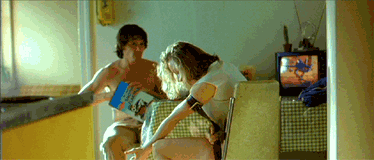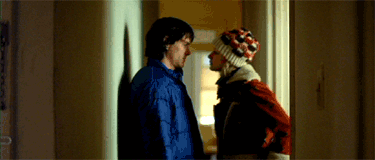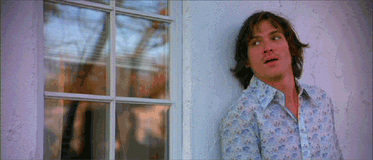Jesus’ Son (Alison MacLean) 2000
 Funny, low-key, and touching, Jesus' Son is easily
one of the best films of the year. Based on a novel by Denis Johnson, the film
tells the story of a drifter (Billy Crudrup, in an nomination-worthy
performance) we know only as “Fuckhead.” The film’s set in the 70’s in
Iowa City and actually feels like it could have been made during the 70’s. The
film has the small goals of many of that decade's best works, and is able to
expertly achieve those goals. This is unlike something like Almost Famous
or Boogie Nights which looks back at the decade with a knowing sense of
irony that permeates even the set design and costuming. This film's aesthetics
are closer to a genuine 70's film such as Five Easy Pieces.
Funny, low-key, and touching, Jesus' Son is easily
one of the best films of the year. Based on a novel by Denis Johnson, the film
tells the story of a drifter (Billy Crudrup, in an nomination-worthy
performance) we know only as “Fuckhead.” The film’s set in the 70’s in
Iowa City and actually feels like it could have been made during the 70’s. The
film has the small goals of many of that decade's best works, and is able to
expertly achieve those goals. This is unlike something like Almost Famous
or Boogie Nights which looks back at the decade with a knowing sense of
irony that permeates even the set design and costuming. This film's aesthetics
are closer to a genuine 70's film such as Five Easy Pieces.
 Like that film, Jesus' Son doesn’t pander to its
audience, and doesn’t condescend toward its characters. Fuckhead tells the
story through a series of vignettes remembered through a drugged haze. The
details aren’t specific, and feel a little kludged. What’s important here
are the feelings. The first half of the film tells the story of his relationship
with Michelle, (a fantastic Samantha Morton) the woman who turns him on to
heroin. They are codependent, and at the same time, unable to be together. FH
gets his name since he manages to fuck up anything he touches, so it’s little
surprise that their relationship is doomed. Their scenes together maintain a
real sense of innocence, which is odd since they’re both far from innocent.
Usually, a portrayal of lowlifes as innocents would have me frothing at the
mouth, but I'm bothered by it here.
Like that film, Jesus' Son doesn’t pander to its
audience, and doesn’t condescend toward its characters. Fuckhead tells the
story through a series of vignettes remembered through a drugged haze. The
details aren’t specific, and feel a little kludged. What’s important here
are the feelings. The first half of the film tells the story of his relationship
with Michelle, (a fantastic Samantha Morton) the woman who turns him on to
heroin. They are codependent, and at the same time, unable to be together. FH
gets his name since he manages to fuck up anything he touches, so it’s little
surprise that their relationship is doomed. Their scenes together maintain a
real sense of innocence, which is odd since they’re both far from innocent.
Usually, a portrayal of lowlifes as innocents would have me frothing at the
mouth, but I'm bothered by it here.
 The second half of the movie deals with FH’s road to
recovery. We are spared any scenes of substance withdrawal, showing that the conflict here isn’t between FH and a chemical. It’s between
FH & himself. FH’s problem isn’t that he’s on drugs. He is able to
kick that habit. It's that he’s a drifter. He simply accepts the events in his
life, and if things stop being easy, he moves on. The film realizes that is a
much harder habit to kick. The film never falls into the main trap of most drug
films… There’s basically a midpoint in every drug film where either the
characters begin an ugly descent or they begin to recover (which results in the
end of the cinematic thrill of the hit and typically begins audience boredom and
directorial speechifying). FH chooses the latter path, but the film maintains
its tone (which is an odd mix of comedy, meditation, and rambling : suitable for
FH's character). The hallucinations that dotted the first half of the film
don’t stop, rather they take on a higher meaning as FH finds himself. Every
vignette in the film works. The cast is stellar. Beside the two leads, there are
fine turns by Holly Hunter, Dennis Hopper, Jack Black, and Dennis Leary. I was
pleasantly surprised to find a drug film that maturely treated drugs not as an
obstacle to overcome, but rather a stepping-stone on the path to selfhood.
The second half of the movie deals with FH’s road to
recovery. We are spared any scenes of substance withdrawal, showing that the conflict here isn’t between FH and a chemical. It’s between
FH & himself. FH’s problem isn’t that he’s on drugs. He is able to
kick that habit. It's that he’s a drifter. He simply accepts the events in his
life, and if things stop being easy, he moves on. The film realizes that is a
much harder habit to kick. The film never falls into the main trap of most drug
films… There’s basically a midpoint in every drug film where either the
characters begin an ugly descent or they begin to recover (which results in the
end of the cinematic thrill of the hit and typically begins audience boredom and
directorial speechifying). FH chooses the latter path, but the film maintains
its tone (which is an odd mix of comedy, meditation, and rambling : suitable for
FH's character). The hallucinations that dotted the first half of the film
don’t stop, rather they take on a higher meaning as FH finds himself. Every
vignette in the film works. The cast is stellar. Beside the two leads, there are
fine turns by Holly Hunter, Dennis Hopper, Jack Black, and Dennis Leary. I was
pleasantly surprised to find a drug film that maturely treated drugs not as an
obstacle to overcome, but rather a stepping-stone on the path to selfhood.
*
* * ½
September,
2001
Jeremy Heilman